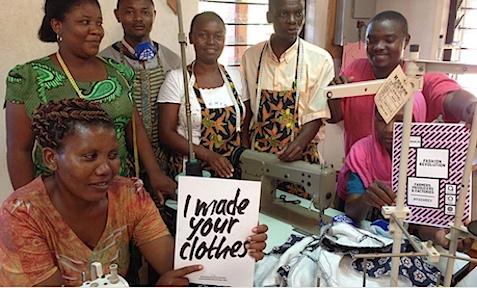
By Brian Collett — The global apparel industry is making changes to promote better practices.
A pact to improve garment factory working conditions worldwide has been signed by the UN agency Better Work and the Fair Wear Foundation, the Amsterdam-based multi-stakeholder campaign group.
The alliance hopes to achieve its aims by streamlining improvements so that more brands can collaborate on remedying employment abuses, offering comprehensive training on issues such as sexual harassment, health and safety, and coordinating factory assessments to minimise audit duplication.
It expects to attract diverse parties, including brands and unions, and to stimulate worker-management communications in the factories.
Better Work believes it will attract new European brands and smaller companies, and the foundation is welcoming access to Better Work’s compliance data.
The partnership has begun with an 18-month pilot at factories in Bangladesh and Vietnam.
Margreet Vrieling, the foundation’s associate director, said: “Together we are capable of better facilitating co-operation between garment brands on improved working conditions. Collaborating with Better Work provides a great opportunity to learn from one another.”
Responsible sourcing is a theme at Gap, the US worldwide clothing and accessories retailer. Gap, with $16bn (£12.4bn, €14.2bn) sales in its last financial year, aims to obtain all its cotton from sustainable sources by 2021. Sustainable material will be evident in all its brands, including Athleta, Banana Republic and Old Navy.
The group claims it sourced 11,500,000lb of cotton certified by the Better Cotton Initiative last year, enough for 7.4 million pairs of jeans.
As part of its responsible business resolve, Gap claims it will increase its purchase of organic, US-grown and recycled cotton.
However, the company cannot predict how much recycled material it will use. Melissa Fifield, Gap’s senior director of sustainable innovation, said: “The recycling of fibres is a challenge, but it’s still important for us to put a stake in the ground. And we are determined to be even more ambitious as we’d like to see more cotton recycling.”
One factor will be scientific advances in production. Fifield said: “We consider our approach to be a portfolio approach. This goal will require additional innovation and further development in current technologies.”
Gap hopes its sustainable cotton policy will spread through the industry and reduce the costs.
Fifield says other goals besides sustainability are relevant, asking: “How do we solve the problems of our customers, and how do we ensure that we are delivering products not only better for the planet but also for those who are buying our clothes?”
Further, the company says its responsible business ethos will extend to water conservation, women’s empowerment, reducing energy consumption and cutting waste.
At the same time a coalition called Cotton 2040 has been created by the non-profit Forum for the Future and the C&A Foundation to make sustainable cotton a mainstream commodity.
Transparency has become similarly important. Fashion Revolution, a UK-based alliance of stakeholders, has produced a transparency index showing a 121.5 score out of 250, or 49 per cent, for the footwear groups Adidas and Reebok, then 120 for Marks & Spencer and 119.5 for H&M. Only eight brands in total registered above 40 per cent.
Fashion Revolution called the results “disappointing”. Few brands were found to be disclosing their efforts on living wages, collective bargaining and cutting consumption of resources.
Co-founder Carry Somers said: “People have the right to know that their money is not supporting exploitation, human rights abuses and environmental destruction.”
On the plus side, the findings showed that 32 brands now publish supplier lists and 14 brands name the centres where their garments are dyed, laundered, printed or treated.
As part of its transparency commitment Asos, the British online fashion retailer, is publishing a list of the factories it uses for its own brand.
The company will extend its commitment by mapping its primary and secondary process sub-contractors by the end of 2018, its fabric mills by 2019 and its raw materials sources by 2020.
To reinforce its commitment Asos is forming a team to help its third-party brand suppliers with ethical and sustainability issues, and is developing a confidential hotline enabling its Turkish factory workers to speak out without fear. The system will be offered to other areas before next year.
In the US Levi Strauss and its charity foundation are putting benefits back into the community with $1m in grants for marginalised communities at home and abroad, including immigrants, refugees, religious minorities and transgender citizens.
The group lists 13 recipients, including missions giving legal consultations in the San Francisco Bay area and women’s health centres in countries whose factories manufacture for Levi.
One beneficiary is United We Dream, an NGO serving 100,000 young immigrants in 55 organisations in 26 US states.
Chief executive Chip Bergh said: “We have a long legacy of standing for inclusion and diversity. After all, Levis Strauss was an immigrant himself and started his business in a city built by immigrants.”
As plastic in the oceans raises concerns, the Stella McCartney label has combined with Parley for the Oceans, which campaigns to end the destruction of marine life, to produce fashion products using fibre made from discarded plastic items such as fishing nets and bottles.
Stella McCartney, daughter of former Beatle Sir Paul, observed: “To take something that is destructive and turn it into something that’s sexy and cool, how can that not be luxury?”
TriplePundit has published articles from over 1000 contributors. If you'd like to be a guest author, please get in touch!














